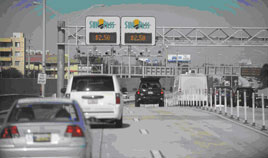By: Brandon Stein
If you or someone you know was injured in a car accident at or near a construction zone, contact our Florida construction lawyers today.
Being a North Miami construction lawyer that helps those injured in car accidents on highways, I frequently come across road blocks (no pun intended) in litigation when trying to sue the Florida Department of Transportation (“FDOT”). Florida personal injury lawyers are always aggressive, but when it comes to attacking the Department of Transportation, the FDOT typically hides behind the shield of sovereign immunity. Florida Statute 768.28 details sovereign immunity, and is almost always cited in arguments by the FDOT.
Not to delve into an entire legal thesis, but essentially the FDOT is immune from construction litigation arising out of an injury resulting from “faulty” roadway or highway design. So, for any South Florida driver that is injured in a car accident and retains a lawyer to sue the FDOT because the highway was designed improperly or dangerously, be prepared for intense litigation.
As a South Florida construction injury lawyer, I have many cases against the Department of Transportation despite the presence of sovereign immunity. In fact, today we are in mediation for a highway car accident on I-95 in Miami involving the FDOT, as well as several other contractors. The car accident occurred back in 2008 and involved the newly installed “Express Lanes.” Essentially, these express lanes are two toll lanes that are separated from the rest of traffic through the use of high performance highway tubular delineators. These delineators are essentially large tube-like plastic poles that are often utilized by construction companies for the separation of traffic.
separated from the rest of traffic through the use of high performance highway tubular delineators. These delineators are essentially large tube-like plastic poles that are often utilized by construction companies for the separation of traffic.
My client had been traveling on I-95 and became trapped in these “Express Lanes.” Unbeknownst to her, when driving within these lanes, no exit is possible for over 10 miles. However, my client had to exit the highway prior to the end of the toll lanes, so she attempted to travel through the delineators in order to exit the highway. Since these delineators were 20 feet apart, it gave drivers the appearance that travelling in between them was indeed possible — but it was not possible. Unfortunately, my client crashed her car and had been involved in a near-death car accident. Fire rescue and ambulances arrived to the scene instantly and thankfully her life was spared.
A major defendant in this construction car accident case is the Florida Department of Transportation. As expected, a major defense of the FDOT is sovereign immunity. So, how do you sue the Department of Transportation for this Florida highway construction car accident? Most Florida lawyers should be familiar with the exception to sovereign immunity. Simply stated, or as simply as one could state this complex area of law, when a dangerous condition exists that is known by the state (i.e. FDOT), the state owes a duty to the general public, such as my client, to warn of this known dangerous condition.

Ultimately, certain precautions must be taken by the state when undertaking construction projects on Florida’s highways. Especially when a project involves a complete transformation of a highway, the Florida Department of Transportation has a duty to warn and inform the public of this drastic change to a roadway that hundreds of thousands travel on every single day.



 occurred, and naturally, several South Florida lawyers received calls from injured drivers. One of those injured drivers was my client, which ultimately led to us filing a Complaint against the
occurred, and naturally, several South Florida lawyers received calls from injured drivers. One of those injured drivers was my client, which ultimately led to us filing a Complaint against the  So, if an accident occurs and the injured person contends that the state is responsible, then he or she must prove the following elements: (1) governmental entity created a known dangerous condition; (2) that known dangerous condition was not readily observable to the public; and (3) the state failed to provide adequate warning informing the public of this dangerous condition.
So, if an accident occurs and the injured person contends that the state is responsible, then he or she must prove the following elements: (1) governmental entity created a known dangerous condition; (2) that known dangerous condition was not readily observable to the public; and (3) the state failed to provide adequate warning informing the public of this dangerous condition.